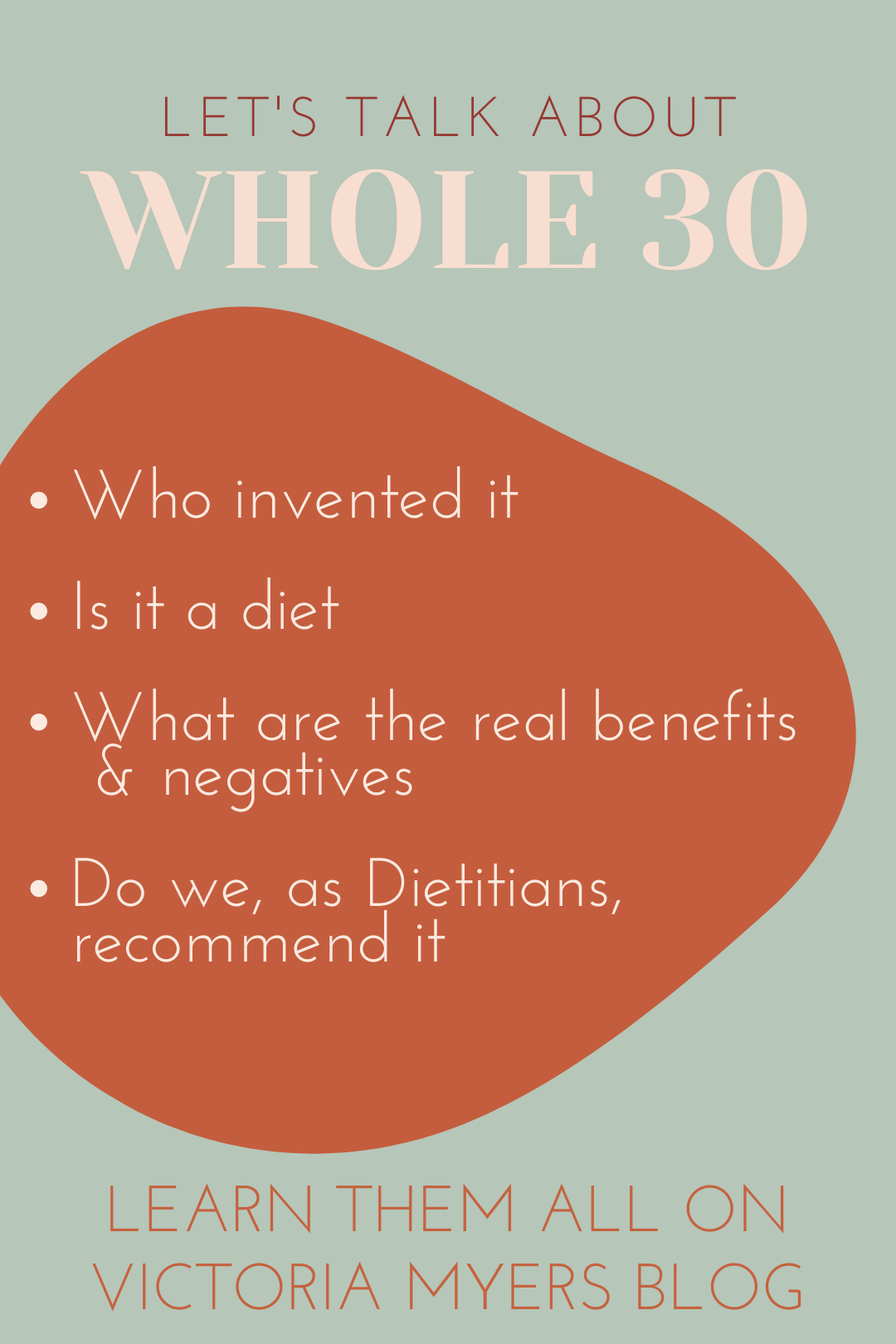The Pros and Cons of the Whole 30 Diet
By: Megan Perez, registered dietitian/nutritionist at Nourishing Minds Nutrition
As we near the end of 2020 (can you believe it??), I can’t help but think about the number of people who may be starting new diets after the holidays. I also think about all the people who are feeling anxious and overwhelmed heading into them. While Thanksgiving and Christmas will likely look different to you and your families this year, you will still probably be faced with lots of foods you aren’t normally around, larger amounts of food, and more people that may possibly make comments about physical appearances. I absolutely LOVE the holidays, but I can relate to these feelings. I used to feel very stressed heading into them as well. This year, I encourage you to be very compassionate with yourself. Between the pandemic, politics, and diet culture, there are A LOT of reasons we may be feeling extra sensitive and emotional right now. This is why I think it is a good time to talk about a very popular diet that tends to show up every January: The Whole 30.
The Whole 30 is a program created in 2009 by nutritionists Melissa and Dallas Hartwig. The authors say it is not a "diet," but a short-term nutritional reset that eliminates several food groups that may adversely affect your body and give the body time to heal. After 30 days of clean eating, the off-limits foods are slowly reintroduced one at a time to see if anything triggers a reaction. Participants focus on eating whole, unprocessed foods including animal protein, vegetables, fruits, nuts, and healthy fats. At the same time, they also avoid grains, legumes, dairy, added sugar, artificial sugar, alcohol, and certain additives. The rules are said to be “simple” but appear very strict. The authors ask that you choose foods with very few, pronounceable ingredients, or no ingredients because they’re whole and unprocessed. You are to completely abstain from the foods to be avoided for 30 days. The program's founders believe that sugar, grains, dairy, alcohol, and legumes affect weight, energy, and stress levels. They say that losing weight is not a focus of Whole 30, and that calorie-counting and weigh-ins are not allowed.
The “Pros” - Proponents believe following the plan can help to:
-Heal the digestive tract
-Balance the immune system
-Eliminate food cravings
-Improve or cure medical conditions such as diabetes (type 1 or 2), hypertension, elevated cholesterol, allergies, endometriosis, infertility, depression, thyroid issues, lyme disease, lupus, fibromyalgia, celiac disease, multiple sclerosis, ulcerative colitis, and more
-Boost energy and metabolism
-Promote weight loss
-Change your relationship with food and help you find food freedom
The Cons:
-It is a very restrictive diet
-Meal planning and preparation are required and are very time-consuming. Participants need to carefully read food labels, avoid most restaurants and takeout, plan ahead, and prepare most meals from scratch.
-Difficult to follow in social settings
-No cheating for 30 days (not even a little bit or you will have to start over at Day 1)
-Participants must have knowledge of and understand food labels and ingredients
-No sugar or alcohol which may lead to physical withdrawal symptoms
-Can be expensive due to avoiding processed, convenient, and cheaper food sources (such as plant protein like beans and tofu or quick meals)
-It does not meet the USDA recommendations due to the elimination of dairy and grains
-The entire attitude of the Whole 30 is extremely black and white with no exceptions or nuances
After researching the Whole 30, I have found what I consider to be the true positive aspects of this program:
-Eat plenty of nutritious foods
-No weighing or measuring
-No fasting or complicated meal timing
-No mandatory products or supplements to buy
-May teach meal planning
-May teach label reading
-Encourages a support team
I list all of the pros and cons that I have found in order to provide an unbiased view (as much as possible) so that you can make your own decision about this diet. Because I have experienced first-hand how harmful I believe it can be, I do however want to share my personal thoughts and observations, as well. I want to start out by acknowledging that the “Pros” listed by the authors in the book are not backed by science. No studies that specifically look into the health impacts of the Whole 30 have been conducted as of 2020. The list of foods to eat and to avoid is also not based on legitimate research. There are numerous false claims listed in the book that I think are incredibly important to point out, specifically the claims about improving or curing certain medical conditions.
There are several reasons that I find the Whole 30 to be incredibly harmful. First of all, it is unsustainable. Any program that encourages a strict diet, cutting out entire food groups and making it incredibly difficult to eat out in social settings without bringing your own food is not likely to last. The harsh language and lack of compassion sets the participant up for feelings of guilt and shame if they make any mistake or “cheat.” This reinforces the “all or nothing” mindset present in several diets that often leads us to equate our diet with our worth or our morality. I don’t believe it is possible to improve your relationship with food while holding on to these thoughts and beliefs. Strict diets and restriction (especially of specific food groups and carbohydrates) typically leads to more cravings, preoccupation with food, and disordered eating or even eating disorders. You do not have to have a diagnosed eating disorder for this to occur. Disordered eating is normalized in the Whole 30, and I have had several clients come to work with us at Nourishing Minds Nutrition after coming off of this program. I believe that this diet and other 30 day type diets only take you further and further away from body trust and a sustainable way of eating.
After completing the Whole 30 myself many years ago, I can say that it was incredibly difficult to sustain. I spent most, if not all, of my free time meal planning, meal prepping, and thinking about food. Because I needed to spend my weekends preparing approved food for the week, I was unable to participate in social events with my friends and family. Once day 30 came, I was extremely proud of myself, and I was also very hungry. I then binged for a few days, which led to feelings of failure, weakness, and shame. This is when I realized that I had to find a better way to live. A life consumed with thoughts of controlling my food and my body was not a life I could live anymore.
While I did list some positive aspects of this diet, I do wholeheartedly believe that the cons far outweigh the pros, and that there are many other behavior changes you could make to improve your health without going on this program or another 30 day program like this one. I also want to add that you don’t have to diet for weight loss or to improve your health. You don’t owe your weight or your health to anyone. We are not all meant to be one size, shape, or weight. Not to mention, humans are built to survive restriction and increase our drive to eat the very foods we have been avoiding. What's worse is the psychological damage this message could cause. That we aren’t good enough as we are, that we need fixed, and that this unsustainable and almost impossible program is the way to fix us.
If you would like even more support for this holiday season then check out our holiday survival guide. This free e-book will help you enjoy and celebrate the holiday season, food included. Click here to grab yours!










